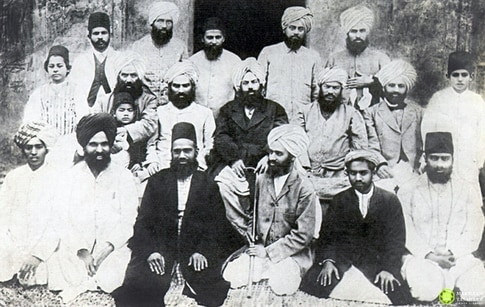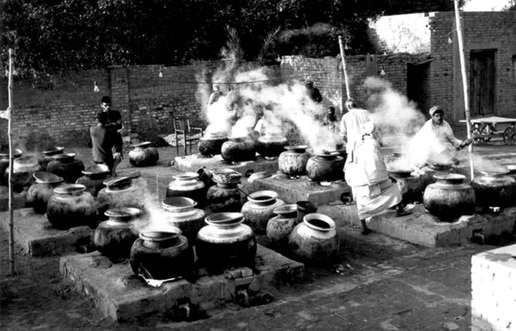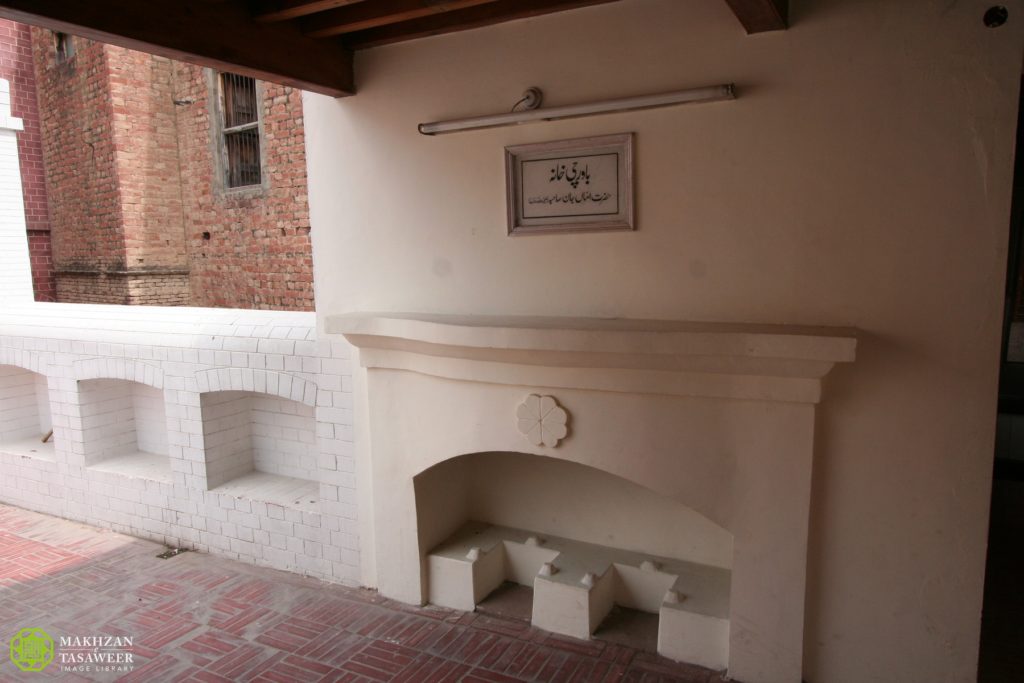
Prophet Abrahamas has been portrayed in detail throughout the Holy Quran, from his rational arguments against idols to his fervent prayers for his progeny.
His respect and hospitality to strangers had also been recognised by Allah. Prophet Abrahamas, when approached by a group of unknown guests, “was not long in bringing a roasted calf ” (11:70) the Holy Quran notes.
Another prophet whose exemplary trait of hospitality is mentioned in the Holy Quran is Prophet Lotas.
Hazrat Khalifatul Masih IIra, addressing the Jamaat prior to a Jalsa Salana in Qadian related how prophet Lot’sas nation were against accommodating guests or showing any hospitality to passing travellers. Prophet Lotas, on the other hand, was extremely passionate and caring when it came to guests. Despite opposition, he would entertain the needs of guests and bring them to his home; it was no easy task due to the opposition, however his resolve to serve overcame any hostility.
Hazrat Musleh-e-Maudra aft er relating the high standards of hospitality within prophets, turned to the Ahmadi audience at Jalsa and said, “Now, I strongly advise you, who have accepted a prophet, that [Jalsa] guests will arrive here. You must serve them with happiness, go to the organisers and present your services to them. Even if you are dealt harshly by any guest, you should show forbearance.” (Al Fazl, 5 January 1918)
Towards the end of the address, Hazrat Khalifatul Masih IIra said, “Hospitality is a very special trait of the prophets”.
The epitome of this attribute was manifested in the character of the Holy Prophet Muhammad, peace and blessings of Allah be upon him. When, out fear for his mental well-being, the Holy Prophetsa rushed home in a state of extreme anxiety aft er his first revelation, his wife, Hazrat Khadijara comforted him by declaring, “Never! By Allah, Allah will never disgrace you” and then listed his great morals, of which, one was that “you respect and serve your guests”.
The Holy Prophetsa engraved hospitality in the ethos of every believer. He said, “Whoever believes in Allah and the Last Day should be hospitable with his or her guests” (Sunan Ibn-e-Majah). Whole chapters of Hadith books have been dedicated to the sayings of the Prophetsa regarding the care and respect guests deserve. Fast forward 1400 years and we arrive at the Promised Messiah’sas time, who followed the Holy Prophetsa in letter and spirit. In fact, surrounding the year 1889, when the Ahmadiyya Jamaat was established, the Promised Messiahas received three peculiar revelations; peculiar because the number of believers and visitors to Qadian was, if anything, very limited. However, these revelations spoke of a grand future. One revelation ordered:
وَسِّعْ مَکَانَکَ
“Enlarge thy abode.” He also received the revelation:
یأْتِیکَ مِنْ کُلِّ فَجٍّ عَمِیْقٍ
“People will come to you from every faroff distant track.”
And thirdly, he was told by Allah:
وَلَا تُصَعِّرْ لِخَلْقِ اللّٰہ وَلَا تَسْئَمْ مِنَ النَّاسِ
“Do not act haughtily (turn thy cheek) and do not tire of people.”

These revelations are living proof of how Allah informed the Promised Messiahas concerning the future, and at the same time, a constant reminder for us to always have open hearts and show the best standards when receiving these guests.
These divine instructions were followed by the Promised Messiahas and can be witnessed through countless narrations of his great example of hospitality. The Promised Messiahas, in his book Victory of Islam, also established hospitality of guests as a branch in propagating Islam Ahmadiyyat.
The narrations, incidents and episodes regarding Hazrat Mirza Ghulam Ahmad’sas incredible passion for hospitality are boundless, particularly when Jalsa Salana started.
Since the first Jalsa of 1891, the Promised Messiahas was at the forefront in serving guests; spreading out bedding, serving food, seeing off guests, bearing expenses and finding better arrangements. The Promised Messiahas would try and cater for the needs of every guest. He would tell the cook at the Langar to ensure everyone was given food according to his preferences.
With regard to hospitality of guests, the Promised Messiahas said:
“I am always mindful that no guest should be inconvenienced and therefore, I always give instructions that guests should be afforded comfort as much as possible. The heart of a guest is fragile like glass and is broken by the slightest of knocks.”
His companions were left speechless when witnessing this prophet of Allah going to such extremes when serving guests.
Hazrat Sheikh Asghar Alira noted that the Promised Messiahas personally looked after his guests and always drew Hazrat Hafiz Hamid Ali’sra attention to it. Speaking of his own experience, he expressed that once, in 1903, he arrived at Qadian after a long journey via train and horse carriage and it had been raining. He was with a friend and upon arrival, they were provided very comfortable accommodation and served delicacies. The Promised Messiahas also personally enquired if they were inconvenienced in any way during their stay.
One companion, Hazrat Seith Ghulam Nabira, narrates that he came to Qadian during winter and the weather was extremely dire as there had been torrential rainfall. He reached Qadian in the evening and went to bed after supper. In the middle of the night, someone knocked at the door. Upon opening it, he found the Promised Messiahas standing with a glass of hot milk in one hand and a lantern in the other. The Promised Messiahas said, “Somebody sent me some milk and it occurred to me that you may be accustomed to drinking milk at night, so I have brought this for you; please drink it.” Hazrat Seith Sahib narrates that his eyes welled up with tears of gratitude.
Hazrat Mufti Muhammad Sadiqra narrates an incident. He recalled:
“I came from Lahore to Qadian. Upon seeing me, the Promised Messiahas said ‘Take a seat. I shall bring you food.’ I assumed a servant would bring the food. To my surprise, I witnessed the Promised Messiahas himself bringing a tray of food for me. When Huzooras saw me, he said ‘Please eat, I shall bring water for you’. Tears began to flow uncontrollably with this in mind that if Hazrat Sahibas, whilst being our leader, serves us like this, then how much more responsibility do we have in serving one another.”
Another companion, Hazrat Maulvi Abdul Karim Sialkotira, narrated that once, when he was in the company of the Promised Messiahas inside a room, some other guests were also present. A knock was heard at the door, as soon as one of the guests was about to move to open the door, the Promiesd Messiahas stood up at once and said, “Wait, I will open the door. You are a guest, and the Holy Prophetsa exhorted us to honour our guests” Guests who arrived at Qadian were from various backgrounds; the poor and the wealthy. Hazrat Munshi Zafar Ahmadra of Kapurthala relates that the Promised Messiahas was once sitting on the roof of Masjid Mubarak, Qadian waiting to have his meal with some guests. One destitute Ahmadi, Mian Nizam Din Sahib, wearing ragged clothes, was also sitting there at a short distance.
Meanwhile, some respectable guests came and sat near the Promised Messiahas. To create space for them, Mian Nizam Din Sahib had to move back until he reached the area where the shoes were placed. When the meal was about to start, the Promised Messiahas, who had witnessed this ordeal, took a plate of food and called Mian Nizam Din, saying, “Come, Mian Nizam Din, you and I will eat together inside.” Thus, the Promised Messiahas always kept in mind the sentiments of all guests, especially if they were of a “lower” social rank.
In the same vein, Hazrat Khalifatul Masih Vaa pior and during Jalsa Salana 2006, reminded the Jalsa volunteers and organisers that a great number of guests from India, Pakistan and Bangladesh, who are mostly farmers and simple in nature, were leaving their countries for the first time to attend Jalsa. Huzooraa expressed that these guests have great thirst for the love of Khilafat, therefore, observing their simplicity, volunteers should not discriminate in their hospitality towards them.

Sacrificing his own comfort for the comfort of guests was no difficult feat for the Promised Messiahas, it was his norm. On one occasion, the bedding at Jalsa Salana had run out and a companion began searching for all the bedding he could to present to the guests. He had also taken the Promised Messiah’sas bedding. Later, when another companion entered the room of the Promised Messiahas, he found him sitting on his bed with a thin cloth over himself and his arms tucked under his armpits. Surprised, the companion asked the Promised Messiahas why he had no bedding. The Promised Messiahas replied by expressing his desire for the guests to be comfortable and that he would be okay.
Hazrat Khalifatul Masih IIra, speaking on the subject of sacrifice for Jalsa guests, narrated an incident of a companion of the Holy Prophetsa. Once, the Holy Prophetsa assigned companions some guests to take care of. One companion took the guest he was assigned to home. He asked his wife what food was available, to which his wife informed him that nothing was left apart from the children’s share. The companion replied by saying that he had brought a guest of the Holy Prophetsa, therefore the children should be put to sleep and then, when the food is ready, the lights should be put out. He explained to his wife that he would tell the guest that there was no light so they would have to eat in the dark. “When the guest starts to eat,” said the companion, “we too will make noises to show that we too are eating. This is imperative as the guests will not eat if he knows we do not have food.” And so, in the dark, the guest ate his food, while the companion and his wife pretended to be eating. In this way, the companion sacrificed the food of his household for a guest. Allah informed the Holy Prophetsa of this incident to which the Prophetsa was very pleased.
This spirit of sacrifice is still present within the Jamaat. Hazrat Amirul Momineenaa, in 2004, narrated how the atmosphere he witnessed in Canada Jalsa Salana reminded him of the Jalsa Salanas in Rabwah. This was because Ahmadis in Canada themselves stayed in basements and gave the rest of the house to other guests, who were at times not even related to them.
Hazrat Khalifatul Masih IIra would also encourage the residents of Qadian to offer their homes for the guests of Jalsa Salana and a huge amount of properties were thus made available during the days of Jalsa Salana.
The Promised Messiahas would exhort his Jamaat to ensure the stay of Jalsa Salana guests was as comfortable as possible. In one sermon prior to Jalsa Salana, Hazrat Musleh-e-Maudra discussed the limited resources of the Jamaat when serving the guests at Jalsa Salana. He explained that the limited funds meant that, at the time, proper arrangements could not always be met. Nevertheless, he listed small, yet effective ways of hospitality that required no extra funds and could be practised by all. He said, “We can greet [guests] with good morals … If someone loses a possession, we can help them search for it … If someone needs to find the whereabouts of a doctor, you can help them”. Accordingly, we can all seek out small effective ways in serving the Jalsa Salana guests.
With the presence of Khalifatul Masih, Qadian served as the Markaz of the Jamaat. Considering this, in 1920, Hazrat Khalifatul Masih IIra reminded the residents of Qadian that the guests of Jalsa Salana would observe those residing in Qadian and see them as examples. He further advised:
“If you, the inhabitants of [Qadian] cannot show mercy to others, like that of parents, then at the very least, you should show mercy like that of an older brother. Those who come here observe you and adopt your example. Thus, you should show high morals … If you do not show a good example then it will have negative effects.”
Further, Hazrat Khalifatul Masih IIra commented on someone who would call Qadian a hospital. Huzoorra said, instead of a hospital, Qadian should be called a “school where people come to gain knowledge and adopt good morals.” With this in mind, it is imperative that those of us who live in the Markaz in the UK, should also adopt good morals and etiquettes for this too is part of hospitality.
The trait of hospitality may be exclusive to prophets, yet it is also very closely twinned with the Jamaat and Jalsa Salana. It is imperative that we uphold these examples set by the Promised Messiahas and his Khulafa so that the guests of Jalsa Salana are properly taken care of. By following and acting upon the great moral of hospitality, our generations to come will also adopt a “special trait of the prophets”.

